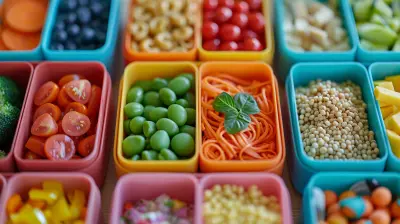Preparing Your Child's Body for School: Nutrition and Sleep Essentials
21 September 2025
Getting your child ready for school isn’t just about packing their backpack or buying new clothes. One of the most important (yet often overlooked) aspects of preparing kids for school is making sure their bodies are in top shape. And this comes down to two key elements: nutrition and sleep.
Think about it—kids are like little engines. Without the right fuel (nutrition) and enough downtime (sleep), they won’t perform at their best. If you've ever seen a child who’s overtired or running on sugar, you know exactly what I mean!
In this guide, we'll dive into how you can ensure your child gets the proper nutrition and sleep they need to thrive in the classroom and beyond. 
Why Nutrition and Sleep Matter for School
A well-fed and well-rested child is more likely to be focused, alert, and ready to absorb new information. Poor nutrition can lead to sluggishness, trouble concentrating, and even behavioral issues. Likewise, sleep deprivation can make kids cranky, unable to focus, and prone to meltdowns.So, what can you do? Let’s break it down step by step. 
The Role of Nutrition in Your Child’s School Readiness
1. The Power of a Healthy Breakfast
You’ve probably heard that breakfast is the most important meal of the day, and for school-going kids, that couldn't be more true. A nutritious breakfast:- Boosts brain function – Essential nutrients help kids stay sharp.
- Keeps energy levels steady – Prevents mid-morning tiredness.
- Supports good behavior – Reduces mood swings and irritability.
What Should a Healthy Breakfast Include?
Instead of sugary cereals or processed snacks, opt for:- Protein: Eggs, Greek yogurt, peanut butter, or nuts.
- Complex Carbs: Whole-grain bread, oatmeal, or fruit.
- Healthy Fats: Avocados, nuts, or seeds.
A quick and easy idea? Whole-wheat toast with peanut butter, a banana, and a glass of milk – filling, nutritious, and school-friendly!
2. Packing a Nutritious School Lunch
Lunchtime at school can be hit or miss. If your child buys lunch, they might end up eating unhealthy, processed foods. Packing a balanced school lunch helps ensure they get the nutrients they need.Lunchbox Must-Haves:
- Lean Proteins: Chicken, turkey, boiled eggs, or tofu.- Whole Grains: Whole-wheat bread, quinoa, or brown rice.
- Fruits and Veggies: Carrot sticks, apple slices, cucumber, or berries.
- Healthy Snacks: Nuts, yogurt, hummus with whole-grain crackers.
A well-balanced lunch prevents sluggishness and keeps their mind sharp throughout the day.
3. Hydration Matters – More Than You Think
Water is often overlooked, but dehydration can lead to fatigue, headaches, and difficulty concentrating. Instead of sugary sodas or juices, encourage your child to drink water throughout the day.Quick Hydration Tips:
- Give them a fun, reusable water bottle to take to school.- Add slices of fruit or cucumber for a naturally flavored twist.
- Encourage the habit of drinking water before meals and during breaks.
Water is like oil in a machine—it keeps everything running smoothly and efficiently!
4. Smart Snacking After School
When kids get home from school, they’re usually starving. Instead of letting them grab junk food, keep nutritious snacks within reach.Healthy Snack Ideas:
- Apple slices with peanut butter- Cheese and whole-grain crackers
- A smoothie with Greek yogurt and fruit
- Carrot sticks with hummus
A good snack refuels their energy without spoiling dinner. 
The Importance of Sleep for a Successful School Day
Now that nutrition is covered, let’s talk about sleep—the secret ingredient to a well-functioning brain.1. How Much Sleep Does Your Child Need?
Sleep requirements vary by age, but here’s a general breakdown:- Preschoolers (3-5 years): 10-13 hours per night
- School-age kids (6-12 years): 9-12 hours per night
- Teens (13-18 years): 8-10 hours per night
If your child isn’t getting enough sleep, they might experience:
- Trouble focusing in class
- Irritability and crankiness
- Reduced memory and learning ability
2. Creating a Bedtime Routine
A consistent bedtime routine helps kids wind down and signals that it’s time to sleep.Tips for a Smooth Bedtime Routine:
- Set a regular sleep schedule – Try to keep bedtime and wake-up time consistent, even on weekends.- Limit screen time before bed – Blue light from screens can interfere with melatonin production.
- Encourage relaxing activities – Reading a book, taking a warm bath, or listening to calm music can help.
- Keep the bedroom cool and dark – A comfortable sleep environment makes a huge difference.
A solid bedtime routine sets the stage for quality sleep.
3. The Link Between Sleep and School Performance
A good night’s sleep improves:- Memory retention – Sleep helps the brain process and store new information.
- Focus and attention – Kids who sleep well are more engaged in class.
- Emotional stability – Well-rested children handle stress and frustration better.
Think of sleep as the brain’s way of “recharging”—without it, everything feels sluggish! 
How to Adjust Sleep and Nutrition Before School Starts
If summer vacation has thrown your child’s routine off-track, don’t worry! You can gradually adjust their schedule a week or two before school starts.Steps to Adjust Sleep Patterns:
1. Move bedtime earlier by 15-30 minutes every night until you reach the desired time.2. Wake them up earlier to get their body used to school mornings.
3. Limit late-night screen time to prevent delayed sleep.
Steps to Improve Nutrition:
1. Start giving school-friendly breakfasts at home.2. Introduce more fruits and veggies into daily meals.
3. Practice packing healthy lunches to make mornings easier.
Making small changes ahead of time prevents last-minute chaos!
Final Thoughts
Preparing your child’s body for school is just as important as buying supplies or meeting the teacher. With proper nutrition and sleep, your little learner will be happier, healthier, and more focused in the classroom.By fueling them with the right foods and ensuring they get enough rest, you’re setting them up for success—not just in school, but in life.
So, let’s start making these small but impactful changes today! Your child’s mind (and body) will thank you.
all images in this post were generated using AI tools
Category:
Childrens HealthAuthor:

Tara Henson
Discussion
rate this article
1 comments
Misty McVaney
Thank you for sharing this helpful guide! Prioritizing nutrition and sleep has transformed our mornings, making the school day smoother for my child. Your insights on balancing healthy habits are invaluable, and I appreciate the reminders to focus on these essentials for our little ones.
October 13, 2025 at 2:22 AM

Tara Henson
Thank you for your kind words! I'm glad to hear the guide has made a positive impact on your mornings and helped establish healthy habits for your child. Wishing you both continued success!


